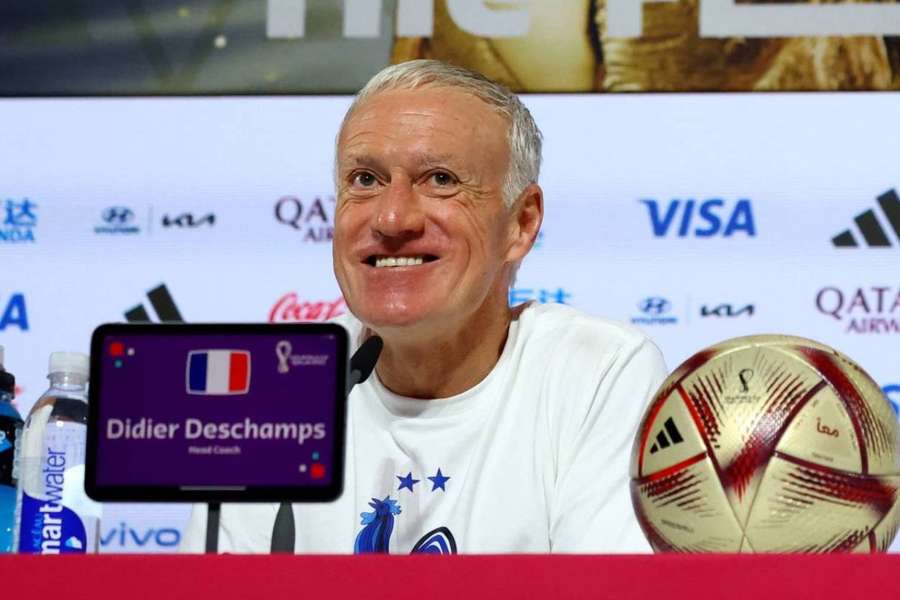But in reality, Didier Deschamps will be playing in his second World Cup final as coach of Les Bleus on Sunday. It is a feat that only Vittorio Pozzo, Carlos Bilardo, Franz Beckenbauer, Helmut Schön and Mario Zagallo have achieved in the past. The 1998 world champion has once again managed to create an osmosis between his players, a crucial element in the quest for the world title in 2018.
A unique know-how in the Didier Deschamps style. It must be said that the French coach, who has played for AS Monaco, Juventus, Olympique de Marseille as well as a season at Chelsea, has always made an impression wherever he has set foot. A unique winning culture, symbol of the 1998 state of mind and influenced by the Italian football of Marcelo Lippi.
The group's power as the doctrine
"He likes to talk to the players, to know how we feel. He will always try to find the best solution for the balance of the team. He has a lot of confidence in everyone. This is a strength on his part and we have a group that is aware of this. That's why when he gives an order or advice, we follow it," said Antoine Griezmann shortly before the match against Poland.
To this, the French coach replied: ''With Antoine and others who have been here for a while, there is a relationship of trust that has developed. This does not prevent me from telling him things that are not going in the right direction. I am a coach, but I am also a human being. Antoine and the older players know that I am there for them, to protect them, without not saying what I have to say.''
The power of Didier Deschamps' teams is the cohesion of the group and the strength of the group to believe in their coach. The results are there to prove the success of the recipe, whether it is with the club or with France. So even if the game proposed can divide public opinion, in the end, it is always Didier Deschamps who wins.
A constant that continues to apply in this 2022 World Cup. The choices of the French coach have been much talked about and criticized constantly before and during the competition, but in the end DD has reproduced the same result as in 2018: reaching the World Cup final. He is 90 minutes away from silencing them for good.
The Benzema case is the perfect example to show the doctrine of the group that the coach from Bayonne advocates. The choice to keep the recent Ballon d'Or winner out of the squad because of his injury was obviously a preventive decision for the player, but also a choice to ensure the stability of the sacred union. DD put the group before the individual, who was not, at first, welcomed by some of the French team's executives, according to information gathered by Flashscore, confirming those released by the French sports press a few weeks earlier.
A continuously progressing tactical approach
In this case, Didier Deschamps had to make a strong choice, but it was not the only one. From a tactical point of view, the plans of the French coach were questioned by himself in the space of a month. Between the last Nations League match against Denmark (2-0 defeat) and the first match of the World Cup, DD decided to switch back to a 4-man defence, whereas Les Bleus had been playing with 5 men for a year.
A good coach knows how to question himself and that is what Deschamps did at that moment. To that end, the coach called up eight academy centre-backs for the Bleus gathering, with players like Jonathan Clauss left at home. Similar decisions to those made in 2018, when Lucas Hernandez and Benjamin Pavard, axis players, were positioned in the flanks. Today, only Theo, Lucas' younger brother, who took advantage of his elder brother's injury in the first match to start, is a full-back by training. Koundé, who is used to playing in the centre of the pitch at Barça, plays on the right flank.
The French coach found another solution to make up for the absence of Pogba and Kanté and to rebalance the midfield: to move Antoine Griezmann down a notch and reposition him in the midfield alongside Tchouaméni and Rabiot. The magic trick was so simple to find... the Atletico Madrid player is the most influential player in his team and most certainly in the competition, like Leo Messi.
Finally, Deschamps' strength is knowing how to read his opponents and find the right plan to win the battle. Against Morocco, France did what others failed to do or were unwilling to do: leave the ball to the opposition. The Atlas Lions had emerged victorious from their games against Spain and Portugal after having less than 25% possession. Against Les Bleus, the latter had the ball (60% over the whole match) and in the end, Didier Deschamps won.
Luck? Well you have to know how to provoke it...
So many people talk about luck or even an animal that protects the coach. It is true that in certain situations, one can say that luck is always on Deschamps' side. The French are often subdued and it takes the opponent missing a penalty (like Harry Kane) or the French defence being positioned on the line (like Koundé against Morocco) to prevent the ball going in.
However, when this happens over time, the assumption of any luck must be put aside. Didier Deschamps knows how to make his teams win and no matter how, the result will come before anything else. Whether you like it or not. It's not just a matter of the result, it's a matter of the result coming first. Three stars for which he will have had a major role. Didier Deschamps. What else?


